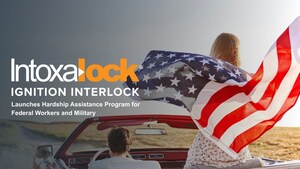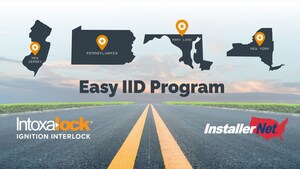
DES MOINES, Iowa, Dec. 20, 2016 /PRNewswire/ -- This time of year brings celebrations, time with family, joy, and peace. Unfortunately, a dramatic increase in DUI offenses and alcohol-related highway deaths has also become a tradition of the season. The Centers for Disease Control and Prevention estimates more than 700 people will be injured or killed each day between Thanksgiving and New Year's Day in drunk driving accidents, a rate two to three times higher than the rest of the year.
According to a research conducted by Harris Interactive, 16 percent of adults say they drink more than usual during the holidays with 50 percent of people saying that alcohol plays a role in their family's holiday gatherings.
Drunk driving not only affects the person driving; it is also dangerous for anyone sharing the roads. Statistically speaking:
- 91+ million Americans take holiday road trips between December 23 and January 3
- 41 percent of highway deaths that occur during the Christmas Holiday and 58 percent during the New Year's Holiday are alcohol related. That is up from the 29 percent average of alcohol related deaths that occur during the rest of the year.
Intoxalock, a leading ignition interlock provider, has compiled the following tips to help drivers avoid becoming a DUI statistic and/or causing injury or even death:
1. Don't drink and drive. The obvious answer to avoiding a DUI during the holidays is to not drink or assign a designated driver if you plan on drinking. This is the best way to keep the roads safer for everyone.
2. Politely decline. Alcohol is a common staple at many holiday gatherings. Just because it's there does not require that you drink it. Partygoers should not feel like they have to drink just because a host offers — it is not rude to choose a non-alcoholic beverage instead.
3. Choose your number ahead of time. If you are going to drink, do what responsible drinkers do — decide ahead of time how many drinks you will have and stick to it. One drink = 1.5 ounces of hard liquor, 12 ounces of beer, or five ounces of wine. Space your drinks out and alternate alcoholic beverages with water.
4. There's an App for That. There are several free or low-cost DUI apps that can help users understand just how impaired they are. A small sampling includes:
- DrinkTracker (iOS) & AlcoDroid (Android). Both apps allow users to log alcohol intake, estimating BAC over time, based on a profile that factors gender, age, height and weight.
- Have a Plan (Android, iOS, Windows Phone). This app encourages users to always "Have a Plan" when drinking. Users can input a list of contacts to call for a ride and can use the 'get a ride' function to locate a taxi service. The app will also provide a BAC estimate based on the number of drinks consumed.
- Breathometer (Android, iOS) & Alcohoot (Android, iOS). Both apps act as personal breathalyzer tests with external devices that connect to an audio jack to take a real-time BAC reading. Both apps also feature options to help users locate alternative transportation.
Other resources to help drivers "find a ride":
- STEARCLEAR (Android, iOS). StearClear is a booking app that connects users with a professional driver who can drive them AND their car home.
- Uber (Android, iOS). The Uber app allows users to easily contact a driver that can take them to their desired destination and accepts a variety of payment options.
- SaferRide (Android, iOS). If you're too drunk to drive, you're too drunk to operate a complex app. SaferRide keeps its interface simple, featuring only three buttons: find a taxi, call a friend or GPS to help friends find you.
- The National Directory of Designated Driver Services. Hosted by the non-profit DrinkingAndDriving.org, this directory provides users with contact information to designated driver services nationwide -- like Uber or Lyft -- sorted by state and county, as well as helpful tips, advice, and suggestions for choosing the right designated driving service.
5. Be a responsible friend. If you are faced with a situation where someone who's impaired is trying to drive, be as non-confrontational as possible and suggest alternate ways of getting to their destination. Take another friend with you to help or act as moral support — it's more difficult to say "no" to multiple people than one. If possible, get the person's keys. If all else fails, call law enforcement. It's better to have a friend arrested than injured or killed.
About Intoxalock
Headquartered in Des Moines, Iowa, Intoxalock (http://www.Intoxalock.com) developed its state-of-the-art ignition interlock device in conjunction with researchers from Iowa State University. Recently celebrating their 23rd anniversary in the alcohol monitoring business, Intoxalock currently services clients that are required to install an IID or home alcohol monitoring unit in 41 states across the nation, in addition to voluntary clients in all states. In the last 10 years, the ignition interlock industry has grown three-fold and is expected to continue as drunk driving legislation strengthens.
SOURCE Intoxalock






Share this article